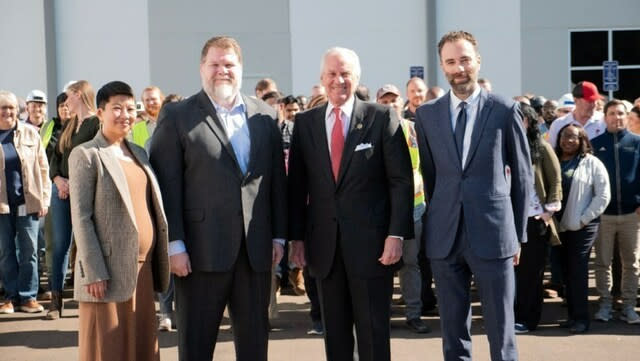Biomaterials Makers MycoWorks, Gozen Mark Major Growth Milestones

The growing interest in biomaterials in the apparel and home goods industries is fueling the growth of companies creating alternatives to synthetic materials.
This week, MycoWorks, which produces natural leather alternative, Reishi, cut the ribbon on its first full-scale facility in Union, South Carolina. The plant works with Fine Mycelium, a proprietary construction of the root-like fungal threads found in mycelium. MycoWorks then transforms mycelium into its Reishi product, a made-to-order natural leather alternative that is used by such brands as Hermès and Ligne Roset. The plant-based leather market is closing in on $97 billion by 2027, according to research from MarketsandMarkets.
More from Sourcing Journal
BASF and Asahi Kasei Join Forces on More Sustainable Stretch Fibers with Lower Impact
Material World: Balenciaga Teases New Biomaterial, MycoWorks x Deadwood Studios
The 136,000-square-foot factory is the largest mycelium production facility in the world and will employ nearly 400 workers at full capacity. To date, the plant has around 150 employees. MycoWorks received a $30 million allocation from the federal government’s New Markets Tax Credits program, which it was awarded on the basis of bringing high-quality jobs to Union County in Upstate South Carolina.
“At MycoWorks we believe our success comes from the creativity and expertise of our team,” said Doug Hardesty, chief operating officer. “Our outreach to the region is critical to our success. Our partnerships with the Upstate educational ecosystem and the leadership in South Carolina will enable us to bring continued training and high quality jobs.”
This summer, Stockholm-based brand Deadwood Studios debuted the first ready-to-wear garments made with MycoWorks’ Reishi at Copenhagen Fashion Week. The collection includes four made-to-order pieces, including a statement coat, vest, jacket and bag.

Biomaterials startup Gozen also received an infusion of cash in the form of $3.3 million in seed funding to accelerate the development and scaling of its biomaterial product Lunaform. The funds came from investors such as Happiness Capital (lead investor), Accelr8, Astor Management and SOSV.
Lunaform is a leather alternative produced by microorganisms during a fermentation process, which creates a material that is naturally strong and flexible since it isn’t assembled in layers like some composite plant-based leathers. The production process takes 10 days and doesn’t require tanning.
With this funding, Gozen plans to open a new facility in Turkey, aiming for an annual production capacity of more than 1 million square feet of the material.
“At Gozen, we produce advanced biomaterials with the potential to unlock circular design,” said Ece Gozen, founder and CEO of Gozen. “With this investment, we’ve shown that we have a path to delivering on that potential at scale.”
At the most recent Paris Fashion Week, Balenciaga became the first brand to use Gozen’s material with the debut of its Lunaform Maxi Bathrobe Coat during the spring/summer 2024 runway show.
“There is a lot of competition now in animal free leather,” said Po Bonson, managing director SOSV IndieBio. “But I believed that Gozen’s approach could surpass all others in both performance and economics, and we’ve already demonstrated this by launching our first commercial product – at Fashion Week, no less. We’ve accomplished in months what it’s taken others years to do.”

